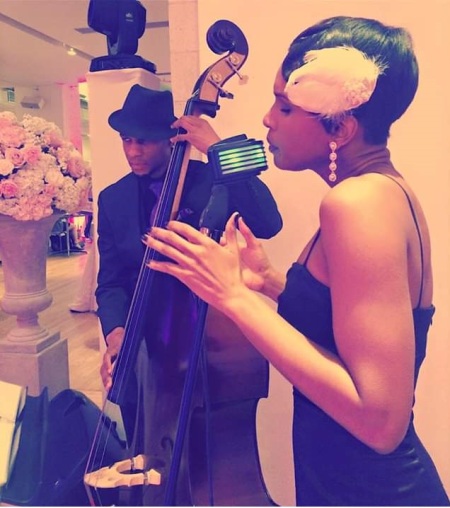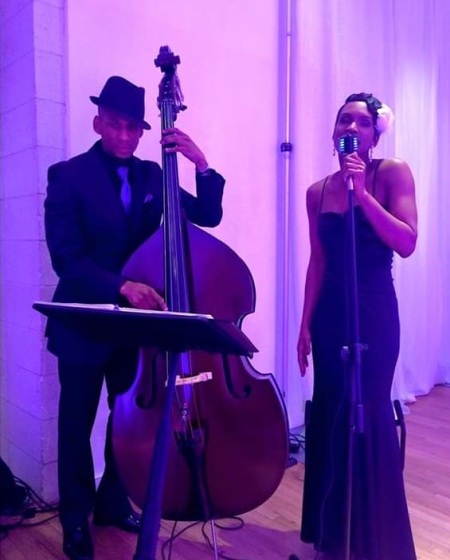Au Naturel: Acute Inflections Bravely Forge a Unique Path Out of Their Undeniable Chemistry
When I first came across bass and vocals duo Acute Inflections, I was immediately intrigued. As a bass player myself, that was to be expected. When I sat down to listen to their debut EP, The Brave, giving it my undivided attention, I was taken aback by their powerful rhythmic hook-up. They exude an ebb and flow that’s infectiously compelling. And as they relate here, the magic happened naturally.
Acute Inflections is a New York based duo consisting of Elasea Douglas on vocals and Sadiki Pierre on the acoustic upright bass. Their musical union happened almost by accident, when some musicians didn’t show up for a gig, and eventually it was just the two of them on stage. They noticed the chemistry, and so did the crowd.
They are going for a pure sound, without any technological assistance such as pre-recorded backing tracks. It is a breath of fresh air in a world full of artifice and boxed-in predictability. Theirs is a music of the moment, one in which even “mistakes” are organically dealt with in real time.
Why the name Acute Inflections, and who came up with it?
Sadiki: We came up with it together. We were trying to find words that would kind of force people to think, to ask that question, and just to be curious. Because we think that what we’re doing is something that requires the listener to be curious to really get it. There’s so much music out there that sort of blasts you, it’s almost too much, and there’s not an opportunity to read between the lines. I think that to really enjoy what we do you need to be in a different state of mind. So, we figured, ‘let’s come up with a name that at least plants that seed.’
Elasea: I think that also the meanings of each of those words – “acute” and “inflections” – also reflect and embody what we do musically. Whether it’s the tone of how we play, the subtleties within our music contain elements of those two words.

Was there ever, in the back of your minds, any moment of trepidation, doubt, or maybe even fear of going out into the world as a bass and vocals duo?
Sadiki: Yeah, absolutely. I would give Ms. Douglas the credit on this. She was a lot more confident than I was. From the beginning I thought we needed to add other musicians, so let’s keep our eyes open to find some, it’s not enough, etc. I think it’s because I don’t view myself as a real musician. I didn’t go to Berklee or anything like that, so I doubted myself. I felt I wasn’t going to be able to keep up with her, support her sufficiently. But slowly I got better. And when you have a room of a couple of hundred people giving you a standing ovation, you kind of have to rethink things, ‘Maybe it isn’t that bad, because these people aren’t complaining.’
Elasea: It started out with him feeling that he can’t keep up with me. Now I feel I can’t keep up with him!
The rhythmic hookup between you two is absolutely perfect. As a bass player myself, I was taken aback at how you both ‘breathe’ together in such perfect sync. Was that something that you had to work towards early on, or did it instinctively fall into place?
Elasea: I think it might be a little bit of both. We don’t rehearse as much as we should. We’re too busy – not that that’s an excuse, but it’s just to explain why we don’t rehearse that often. It’s totally magical, and no credit to us – I give that to the universe – we have this energy, musically, spiritually, and emotionally, that we’re able to “experience the magic” in a sense, without rehearsing. I think the rehearsing perfects it. The naked eye won’t see the imperfections right off the bat. But we know we could be better at some things. We’ll go for that extra perfection during rehearsals when we finally get around to it. I think it’s au naturel.
Sadiki: It’s definitely scary how natural it is. There’s times when we’re at a gig and we’re tired, and I’ll accidentally screw up a rhythm, and she’ll just naturally screw up that rhythm at the same time, and someone from the audience will comment, “That was amazing, how you guys slowed down and stopped!” It’s an organic chemistry going on.
Sadiki, I noticed that you use a lot of ghost notes [percussive sounds attained by plucking a string but not pressing down on the fingerboard to define a pitch] and other percussive effects on the bass, which help to propel the rhythm in the absence of other instruments, especially drums. Is that something you consciously decided to utilize, or is that just your natural way of playing?
Sadiki: I’ve been a bit of a “repressed” musician, at first when I was learning. Initially, I was classically trained, and I liked jazz and James Brown and hip-hop and such growing up. I wanted to try to do what other musicians – not necessarily bass players – were doing. But in a classical setting, you have to stick to the sheet music. So, when this got started, I thought I could maybe incorporate a lot of things that I thought were cool – sometimes I wouldn’t even notice I was doing it. People from the audience and even musicians would come up and say, “That was cool, how you were doing that percussive thing on the body of the bass.” And that sort of encouragement helped me grow into it, whatever it is…I don’t have a name for it.
Prior to Acute Inflections, what were your musical experiences?
Elasea: I did a Broadway show – which included an orchestra, and also choirs and other groups.
I think I went through something similar to what Sadiki mentioned earlier. To me, I felt it during the Broadway show. There, you have to stick to what the show is. I understudied a lead role. I always did what I was supposed to, but I wanted to add a little bit more color, a bit more “me.” I was often told not to, and that I was “too jazzy.” That kept coming up.
So, did you decide to “take the hint” and pursue jazz then?
No, I think I just kind of flowed. Then I did my own projects, and I wouldn’t say they were necessarily jazz, as in playing standards, but since I supposedly sing in a very “jazzy” way, then it probably had a jazzy feel to it. Once I started doing my own projects, no one could say anything. [Laughs]
Sadiki: I started off in classical orchestras, chamber music and such. Then I started getting into the jazz world, playing in church and playing with friends who liked blues…kind of jumping around a little bit.
I don’t have nearly as much experience as she does, it’s always been a hobby for me. After college, I stopped, gave my bass to a friend, and didn’t play for ten years.
I find that interesting. You had mentioned in a prior interview for VUE that you gave up the bass altogether because you didn’t want to be a professional musican. Neither do I, but I’m not getting rid of my bass! Can you elaborate on your thought process behind all that?
Sadiki: I think my personality is one that doesn’t allow me to be told what to do too much. I saw my musical future as one in which I would be hearing a lot of, “Hey, you’re the bass player, you’re not supposed to do that.” I enjoy playing, but if it’s going to involve being told not do things that I think might be cool or interesting, then I just won’t play anymore. There’s plenty of other bass players who will follow your instructions and just read the sheet music. You can hire one of them. Plus, I have many, many other interests. I always find something to entertain myself.
I missed music, but…Elasea, even on our days off, she’ll have music on, sing along, that sort of thing. If I have a day off, I’ll ride a motorcycle or play basketball. It would take a lot of days off from music for me to just naturally touch the bass.

[To Elasea] In your VUE interview, you mentioned that you studied at a conservatory where the training was focused on classical. As a performer or even as a listener, do you still have an interest in classical music?
Elasea: I do like to incorporate it, play around with it a little bit sometimes. Even in some of the covers that we do. For instance, we do “Ain’t Nobody,” and during the ending we do it in a bit of an operatic way. With what we’re doing now, we’ll add some elements when they fit.
And I’m sure when we produce our own concerts, when we have more of our original music, we love being epic, so we’ll definitely add those elements.
The title track is “The Brave.” As it turns out, it’s “The Star-Spangled Banner.” Why did you pick that tune as the title track, and change its title?
Sadiki: I think we just wanted people to look at the national anthem a little differently, and specifically emphasize the last few words in it, “the home of the brave.” We wanted to remind people that this country was started by people who were considered brave. And, musically, just a reminder to be brave, to be creative, to take risks and try to do great things.
And, humbly speaking, we think what we’re doing is brave. Keeping this just as a duo – no backing tracks, no loop stations, and we don’t confine ourselves to just the genre of jazz. If we feel like doing a pop song, or the national anthem, we’ll do it and put our own spin on it.
What are your future plans? Any tours, more recordings?
Elasea: We plan to record a holiday album at some point. We wrote a holiday original that we think can become a part of the holiday tradition. We want to get more of our music out. Also, we want to try doing the typical tours and festivals for about a year, to feel what that’s like. Ultimately we want to produce shows and write for television and film. We’re really good at creating music together that has a storyline and emotion. Many times we’re watching a TV show and we say, “We could’ve written the perfect jingle or song for this!” We definitely want to get more into that side of things.
I think your music and vibe would be absolutely perfect for a James Bond theme song.
Elasea: We hear that all the time!
Sadiki: My best friend called me once after he listened to one of our originals. He thought it was a cover of a Bond song. He was adamant, but I told him, “No, this is an original.” It took some convincing, but he really thought that it was from [the Bond film] Skyfall.
Thank you guys so much for sharing your thoughts.
Sadiki: Thank you for the opportunity.
Elasea: Thank you for thinking of us.
You’re most welcome.
Visit the Acute Inflections website here.
Leave a comment